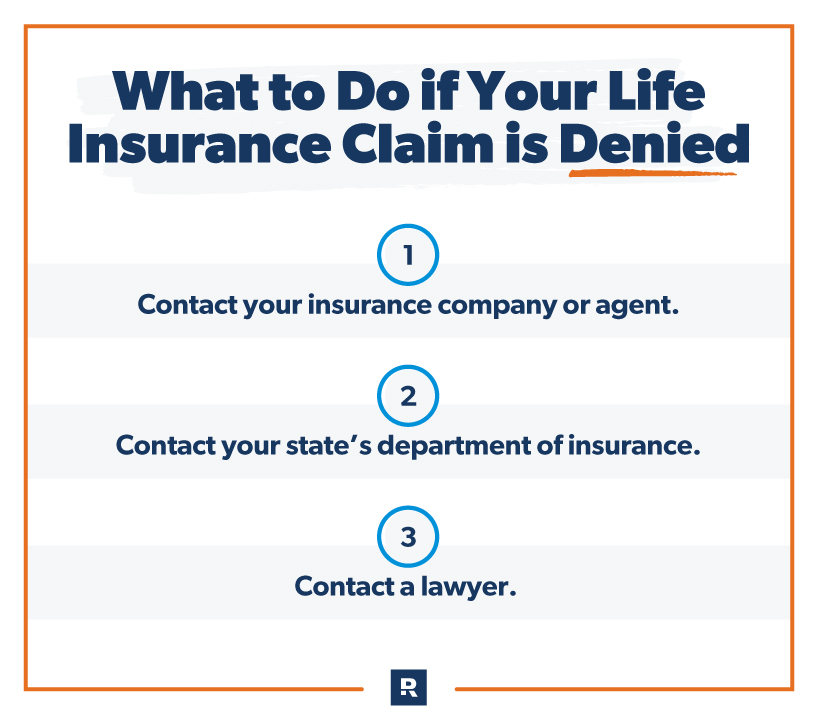
If you’re reading this, chances are you’re going through a pretty difficult time. First and foremost, we want to say we’re sorry for your loss. Once the fog of grief clears a little, you’ll need to file a claim on your loved one’s life insurance policy. But you probably haven’t had to do anything like this before. That’s okay. We’ll walk you through it step by step.
How to Claim a Life Insurance Policy
The biggest question people have about life insurance is how to actually file a life insurance claim. The truth is, the process is a lot like filing for any other kind of insurance. Here are the basic steps:
1. Contact the insurance company or agent. They should be able to explain their process for filing a claim. The name of the insurance company will be in big letters on the life insurance policy, so there’s no way to miss it. If you can remember the agent you worked with, ask for them specifically.
Compare Term Life Insurance Quotes
2. Get copies of the death certificate. Make sure you get certified copies from the funeral director. Life insurance companies won’t take photocopies. And this is a little off topic, but it’s important: Get at least 10 certified copies of the death certificate. You’ll need them to cancel subscriptions, close accounts (like cell phones), get access to financial accounts, file income taxes, and contact utility companies to turn off services.
3. Fill out the paperwork and send it in. Most insurance companies make their forms available online. If that’s not an option, just call the insurance company or agent to find out what you need to do. They’ll probably ask you to send the death certificate in the mail with the paperwork.
4. Specify how you want to be paid. Some insurance companies will issue the payout in a lump sum, but there may be other options. You’ll need to tell the company your preference. Keep reading to find out more about your options.
Once all this is done, you wait. Depending on which state you live in, an insurance company could have up to 30 days to review the claim and accept or reject it. In most cases, though, companies will pay out a life insurance claim a week or two after receiving the paperwork. If they take too long to pay out a claim, an insurance company faces hefty interest charges, so they don’t want to drag their feet too much!
Learn the Smarter Way to Do Life Insurance
Life insurance can feel freakin’ confusing. Sign up to get Ramsey’s no-nonsense advice, including free access to Dave’s video from Financial Peace University (normally $80), plus guides and resources sent right to your inbox.
How Are Life Insurance Claims Paid?
Life insurance claims are paid in a few different ways. Here’s a breakdown of each option.
A Lump Sum Is Paid All at Once
Just like it sounds, a lump sum payout means the beneficiary (the person listed in the policy to get the payout) receives the money all at once. If you choose this option, you can immediately pay off any debt your loved one might have left behind. Once that’s done, you can take the time to grieve without a bunch of bills hanging over your head.
After a couple of months, when the chaos winds down, you’ll want to talk with your financial advisor about investing the rest of the payout so you and your family can use it later on if you need it.
Other Payout Options
One payout alternative is to get installments. With this option, the insurance company pays out the benefit on a set schedule rather than all at once.
Some other similar options are interest income or payout checkbook accounts. With an interest income account, the life insurance company will offer to hold your money for you and pay you the interest the money generates. With the payout checkbook option, the insurance company keeps the money in an account and you can write checks on that account whenever you need to. You can keep using this payout checkbook until you’ve used up all the money in the account.
There’s one important thing you need to know up front: You don’t have to pay income taxes on the actual life insurance payout (which means you won’t have to pay anything if you take the lump sum). But you will be taxed on any interest the money earns during the length of the payout if you choose the installment, interest income or payout checkbook option.
And keep in mind, there’s a fatal flaw with these three plans: You don’t control the money when it’s not in your hands. Yes, you want the money to grow, but if the money is with the insurance company, you don’t get to decide where or how that money gets invested.
You’re much better off to take the lump sum. Then you can go to your financial advisor and choose the mutual funds you want to invest in yourself. You want to maintain control of your financial situation, not leave it to some insurance company.
Got Kids? Use These 5 Tips to Get the Right Length of Life Insurance.
If you have kids depending on your income, you might be wondering, How long should my life insurance policy last? Great question!
Potential Problems With Collecting Payout on Life Insurance Claims
Life insurance claims are rarely denied. As long as you present the company a valid death certificate, most reputable companies will pay the benefit they owe you. In the rare cases when claims are denied, it’s generally for one of the following reasons.
The policy owner stopped paying the premiums.
Life insurance is only valid so long as the owner stays current on the payments—after all, the money to pay claims has to come from somewhere! But lapses can happen. And when they do, policies expire. We sure hope that’s not the case in your situation. Either way, it’s a good reminder to be sure and keep your life insurance (and any other policies) current.
The insured lied on the application.
It’s also uncommon to see a life insurance claim canceled because of fraud. When it does happen, it’s usually related to the timing of the policy purchase and the person’s death.
For example, an applicant may choose to hide the fact that she’s a smoker from the insurance company to save on her premiums. If she dies and the company realizes they insured a secret smoker, the company might deduct the total amount of her (dishonestly gotten) nonsmoker discount from the death benefit. But they wouldn’t deny the entire claim. In fact, smoking isn’t one of the deal breakers for a life insurance claim.
Other hidden facts about your health or lifestyle might actually result in an insurance company denying a claim, like a terminal diagnosis, risky activities or having a family history of certain diseases. The rules will vary by company. But even in cases where a policy owner lied about those details, if enough time had gone by, the company might not bother to change the payout amount at all. The purpose of the fraud rules isn’t to punish beneficiaries—it’s to help the companies recoup losses when applicants lie.
The cause of death fell outside the scope of the insurance coverage.
A few causes of death might also prevent your claim from being paid, but it’s not a common basis for denial. One example is when a policy has something known as an exclusion—usually related to a risky hobby like skydiving or car racing—stating that if the insured dies during those activities, they would not be eligible for a payout.
Other circumstances around a person’s death could cause the claim to be denied. If a person died while committing a felony, for example, a felony exclusion could keep their beneficiaries from receiving the payout. Not all policies have felony exclusions, but it goes without saying—crime doesn’t pay.
A claim can also be denied in the case of suicide. Although suicides are usually paid out, the common rule is that the policy has to be at least two years old at the time of death. The sad reason for the rule is to keep people from getting last-minute coverage before committing suicide. This both discourages people from leaving their families financially unprotected and encourages them to find the help they need.
(If you or someone you know is having suicidal thoughts, there is hope. And there is help. Call the National Suicide Prevention Lifeline at 1.800.273.8255.)
What to Do if Your Life Insurance Claim Is Denied
If your claim is denied, here are the steps you need to follow:

- Contact your insurance company or agent. The insurance company can’t deny your claim without giving an explanation. Once you get the reasons, address these issues if they’re incorrect.
- Contact your state’s department of insurance. If you have a valid policy and you’re getting the runaround, one call to the state authorities will generally get the process moving quickly.
- Contact a lawyer. Some insurance companies just won’t pay, even if your claim is valid. If that happens to you, you may have to resort to getting an attorney. But this is rare, and we hope you never have to deal with it.
It’s painful to think about your loved ones dealing with a life insurance claim on you, but it’s nothing compared to what they’d go through if you didn’t have any life insurance at all. (And speaking of hard end-of-life issues, a will is another key protection you don’t want to be without. Be sure it’s part of your own estate planning, both for your legacy and your family’s sake.)
If you need life insurance today, you’ll see a lot more options and savings by working with a broker or independent agent rather than a captive agent. We recommend Ramsey Trusted partner Zander Insurance. They’ll walk you through the process from start to finish. It’s one of the most loving things you can do for your family.
Life Insurance Calculator
You can get an idea of how much you need (and save some brain calories while you’re at it) by using this quick life insurance calculator.



